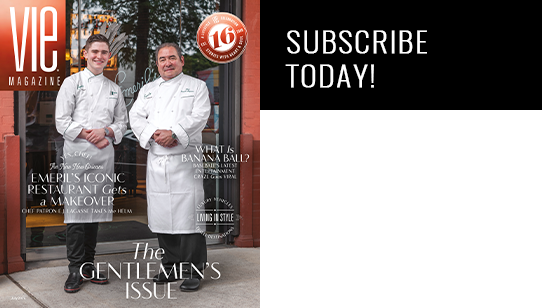
vie-magazine-inner-beauty-hero
Some people choose to see only the world’s flaws, but if you pay attention, you’ll find that beauty is all around you. It can be in the sounds you hear, the places you visit, and the people you meet. Some people seem to radiate beauty and positivity, like professional hairstylist and model Brooke Miller, our Health and Beauty cover girl. Photo by Sohail Chouhan.
Going Acoustic
The Beauty in Everything
By Nicholas S. Racheotes
From my deck on Cape Cod, the view is rich with the sounds of serenity. It is an afternoon in the middle of August, and the west wind is laying down an instrumental track in the maple leaves. Somehow, this tree was spared by our resident arborist.
The vocal is provided by a song sparrow, whom we’ve named Edith after Édith Piaf, the Little Sparrow, whose throaty French singing once captivated the world. It occurs to me that the bird, like the chanteuse, is voicing the beauty of her soul. There are backup singers as well: the ice cubes that are kissing in my glass, a quartet of goldfinches, and a honeybee who mistakenly thinks that he can meet his quota for the day by gathering the nonexistent pollen from my grizzled locks. But I didn’t write this to school you on the birds, the bees, and my taste for distilled beverages. Think of this essay, rather, as your engraved invitation to meet at the intersection of the beauty that lies within ourselves and the beauty surrounding us.
The music plays on. Across the street, a pool full of little kids, still young enough to enjoy lives uncomplicated by their impending sexuality, is decorating the silence with their laughter. There is such sweetness in their joyful shrieks. Soon, but, believe it or not, nowhere near soon enough, I’ll be back on a college campus. I’ll be reveling in the annual noise of a new semester. The returning students will have missed one another over the summer and be drowning each other in the mixture of fear and happiness marking their speech. They’ll be comparing ringtones and downloads. They may be whining in four letters about being shut out of a desired course. Their talk will devolve into woofing about the demands of assignments and meowing about faculty. They’ll also be chirping merrily about, “like who’s paired up with like who already.” We taxpaying grown-ups have granted them the privilege of searching for truth and beauty amidst the distractions of their world.
With a speed that always amazes, summer, which stretches from Memorial Day to Labor Day on the commercial calendar, will give way to winter, which runs from Halloween to Tax Day according to the same source. This span offers a veritable candy factory of sweet noise. In the mall, parents speaking their native language are being answered in English by their sons and daughters. By paying close attention, I’ve learned to say, “Mom, speak English. We’re in America now” in Mandarin, dialects of other parts of Asia, Arabic, Russian, Spanish, Creole, and the languages of Africa. Such exchanges are the outward signs of generational conflict and clashing cultures that always seem to resolve themselves. To me, these are the welcome sounds of diversity, but not the only ones.
In the elongated winter season, attentive listeners can even catch the echoes of God’s voice. Not on the radio stations, whose program directors turn themselves inside out to get Christ out of Christmas by deeding the holiday over to Rudolph, Frosty, romance by the fire, and a Santa who is as far from the real Saint Nicholas as we are from the edge of the universe, if the universe has an edge. No, God is talking in the meaning of the “Love you!” that ends so many phone calls, in the first spoken words of the learning-disabled child, at Thanksgiving dinner in a shelter with the homeless, in the Koran chanted at the mosque, in the Psalms at the temple, in the voices of a thousand choirs, and in the “Hey, how you doin’?” on every street corner. Taken together, they comprise the mystery and magic of our private selves reaching toward one another.
How sweet the bond of imagination can be. How quickly it dispels the bleakness.
Winter doesn’t necessarily shut us in and distance us, but brings us together in sound. Think of the sonic dance of snow against a window. Now, consider the rush of ocean waves as they roll over the stones of so many beaches. How sweet the bond of imagination can be. How quickly it dispels the bleakness.
The briefest month even rewards ardent listeners. February has its moments. Find the shouts of joy or the groans of disappointment in the feasting households on our national day of carnage, also known as Super Bowl Sunday. With a little imagination, I can detect the swish of clothing and dare not speak of other things present in a valentine’s surprise.
Is April really “the cruelest month” as a poet once wrote? Perhaps it is to the hypersensitive few, but not to these ears of mine. Was that a teenager trying out Hebrew at Passover or was it a grandfather explaining the symbolism of Easter eggs? The many forms prayer can take appear in all seasons. Take not the mouthed driver-to-driver curses, but the grateful wave of thanks you get for allowing another car into your lane. I interpret that as the silent sound of inner beauty.
Sometimes, when memory speaks, I need to escape into the noises of spring. The sweep of the paintbrush and the thump of a hammer as a neighbor makes those long-postponed home repairs, the power lawn mower that shatters the stillness of a Saturday morning, the dialogue between baseball and glove, and the skidding of the new bicycle on a sandy street all serve the purpose. They testify to pride, to honing skill, and to affirming ourselves.
In his own annoying way, a certain colleague of mine plays his part. He fancies himself the whistling version of a jazz master. Unfortunately, we don’t enforce the rule enacted by the editors of The New Yorker long ago: No public whistling! Not for this savant of the shrill who is now swept up in a paroxysm of vernal joy. He is blistering the paint on the corridor walls with a warbling version of “It Might as Well Be Spring,” and it might as well.
Rhyming Paul Simon had it right long ago when he beckoned us into the sound of silence. I delight in the thought that quiet does not and cannot exist. The philosophers posted this verity to our civilization. Socrates was overheard by Plato declaring, “I ask troubling questions, therefore I am.” Descartes doubted, therefore he was. Across the parentage of the world’s religions, men and women declared, “We believe, therefore we are.” Why, even the moderns, twisting the tail of logic, challenged us with paradoxes that threaten the very existence of meaning. At the same time, they expected us to heed what their words meant.
Still others have welded our being to awareness of perceptual categories, to seeing ourselves in others, to engagement in class struggle, and even to inalienable (or should it be unalienable) rights. This is all well and good, but deep thinking can make your eyes do funny things, such as close in sleep. My unsophisticated mind takes matters elsewhere, to the utterly simplistic.
When the night stillness of the house opens its arms to the quiet, a truth is born. I listen, therefore I am. I hear my own blood circulating. I rehearse the lyrics of remembered songs. I plumb the treasury of cherished words and even the scoldings of loved ones no longer living. My existence is confirmed in them. The content of our character is shaped by what we remember and how we use or curb so heaping an accumulation of impulses.
Because all writing, no matter its quality and purpose, ends in silence, I leave you to yours. Instead of ringing phrases calculated to fill your ears with syntactical elegance and your mind with memories as enduring as time itself, I’m not going to conclude. You do it. Write your own happy or unhappy noise. Take control again of your own precious silence. Go acoustic. Let the wondrous sounds of the world pour in and what you have to add to them pour out.
—V—
Nick Racheotes is a product of Boston public schools, Brandeis University, and Boston College, from which he holds a PhD in history. Since he retired from teaching at Framingham State University, Nick and his wife, Pat, divide their time between Boston, Cape Cod, and the Western world.
Share This Story!
KEEP UP WITH THE LATEST STORIES FROM VIE




































































































































